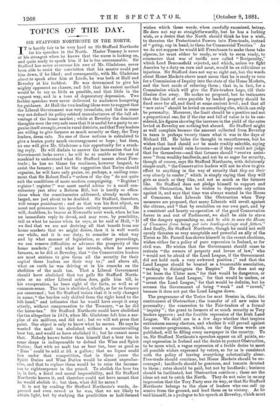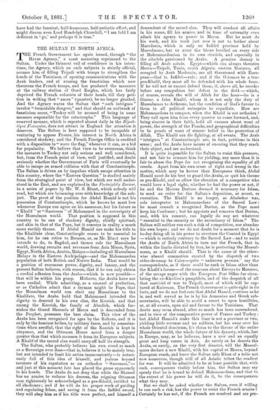TOPICS OF THE DAY.
SIR STAFFORD NORTHCOTE IN THE NORTH.
IT is hardly fair to be very hard on Sir Stafford Northcote for his speeches in the North. Master Tommy is never at his strongest when he knows that the nurse is looking on, and quite ready to spank him if he is too unreasonable. Sir Stafford has never overcome his awe of Mr. Gladstone, never been able to resist the conviction that his master could put him down, if he liked ; and consequently, with Mr. Gladstone about to speak after him at Leeds, he was both at Hull and Beverley at his feeblest. He was determined to give his mighty opponent no chance, and felt that his easiest method would be to say as little as possible, and that little in the vaguest way, and in a tone of deprecatory depression. Two feebler speeches were never delivered to audiences hungering for guidance. At Hull the two leading ideas were to suggest that the Liberal Government was very irresolute, and that in some way not defined its policy robbed manufacturers of the full ad- vantage of the home market ; while at Beverley the dominant thoughts were the very safe ones that it is useful for a party to or- anise itself strongly, even in rural districts, and that Tory leaders are willing to give farmers as much security as they, the Tory leaders, deem safe. No one of these notions is calculated to give a beaten party much encouragement or hope ; but then, no one will give Mr. Gladstone a fair opportunity for a crush- ing reply. He will disdain to answer the insinuation that his Government lacks nerve ; he will be as unable as the rest of mankind to understand what Sir Stafford means about Free- trade ; he has no blame for readiness, however languid, to assist the farmers ; and for the suggestion that Tories should organise, he will have only praise, or, perhaps, a smiling com- ment that Sir Robert Peel's "orders of the day" do not quite suit the conditions of more modern campaigning. "Register ! register I register !" was most useful advice to a small con- stituency just after a Reform Bill, but is hardly so effica- cious when the constituencies addressed, already much en- larged, are just about to be doubled. Sir Stafford, therefore, will escape punishment ; and as that was his first object, we must not pronounce his speeches entirely unsuccessful. He will, doubtless, be braver at Newcastle next week, when he has no immediate reply to dread, and may even, by possibility, tell us what he means when he says, as he said at Hull, "If we find that we are not deriving all that benefit from our home markets that we might desire, then it is well worth our while, and it is our duty, to consider in what way and by what manner of legislation, or other proceedings, we can remove difficulties or advance the prosperity of the home markets ;" and what he intends, when he assures farmers, as he did at Beverley, that "the Conservative leaders are most anxious to give them all the security for their capital those leaders see their way to ;" and above all, what on earth he was driving at in his remarks on the abolition of the malt tax. That a Liberal Government should have abolished that tax galls Sir Stafford North- cote as no other Liberal action does, galls him till, in his exasperation, he loses sight of the facts, as well as of common-sense. The tax is abolished, wholly, as far as farmers are concerned ; but Sir Stafford insists that it is only changed in name," the burden only shifted from the right hand to the left hand," and intimates that he would have swept it away utterly, without compensation to the Treasury, "as he did the horse-tax." Sir Stafford Northcote could have abolished the tax altogether in 1874, when Mr. Gladstone left him a sur- plus of six millions, and did not ; but we will not press that point. Our object is only to know what he means. He says he wanted the malt tax abolished without a countervailing beer tax, and would so have abolished it ; but he cannot mean that. Nobody knows better than himself that a beer tax in some shape is indispensable to defend the Wine and Spirit Duties ; that with no malt tax or beer tax, beer as good as "Bass" could be sold at 3d. a gallon ; that no liquor could live under that competition, that in three years the Spirit Duties and Wine Duties would be almost unproduc- tive, and that to replace them would be to raise the income- tax to eighteenpence in the pound: To abolish the beer tax is, in fact, a fiscal and moral impossibility, and Sir Stafford Northcote knows it, and therefore could not have meant that he would abolish it ; but theni what did he mean ?
It is not by reading Sir Stafford Northcote's words, de- pressed and even cowed as he was, that we are likely to obtain light, but by studying the proclivities or half-formed wishes which those words, when carefully examined, betray. He does not say so straightforwardly, but he has a lurking wish, or a desire that the North should think he has a wish, to threaten the Protectionist Powers into Free-trade, instead of "going, cap in hand, to them for Commercial Treaties." As we do not suppose he would kill Frenchmen to make them take alpacas, he must either be ready, or wish to seem ready, to commence that war of tariffs now called "Reciprocity," which Lord Beaconsfield rejected, and which, unless we fight America by a duty on corn and meat, would be as ridiculous as injurious. Sir Stafford does not say so right out, but the words about Home Markets above must mean that he is ready to vote for a Commission of Inquiry into the state of the Home Markets, and the best mode of relieving them ; that is, in fact, for a Commission which will give the Fair-traders hope, till their illusion dies away. He makes no proposal, but he insinuates that the limit of rates payable by landed property should be fixed once for all, and fixed at some ancient level ; and that all - "new rates" should be levied on something else, which can only be personalty. Moreover, the limit should be a positive and not a proportional one, for if the rise and fall of value is to be con- sidered, his figures showing the increase in the yield of the rates levied at Beverley are nothing but absurd. Sir Stafford might as well complain because the amount collected from Beverley in taxes is perhaps twenty times what it was in the days of Richard III. He hides the thought in smoothnesses, but he wishes that land should not be made readily saleable, saying that purchase would rain farmers—as if they could not judge that for themselves—and that farmers should "receive assist- ance" from wealthy landlords, and not be so eager for security, though of course, says Sir Stafford Northcote, with deliciously simple craft, "the Conservative leaders will not be slow to give effect to anything in the way of security that they see their way clearly to confer ;" which is simply saying that they will give as much as they like, and not as much as the farmers like. Sir Stafford does not pledge himself to support and cherish Obstruction, but he wishes to deprecate any action against it, and says that time was always wasted in the House of Commons, that Liberals like Obstruction when Tory measures are proposed, that many Liberals will revolt against the cloture, and "that by resolution on our own part, and by a consistent and hearty co-operation of the good Conservative forces in and out of Parliament, we shall be able to stave off the dangers approaching us, and be able to save the House of Commons from being put into leading-strings and fetters." And finally, Sir Stafford Northcote, though he could not well openly threaten so very acceptable and powerful an ally of the Tories as Mr. Parnell has shown himself in the recent elections, wishes either for a policy of pure repression in Ireland, or for civil war. He wishes that the Government should cease to restrain "the owners of property and, lovers of law," who "would not be afraid of the Land League, if the Government did not hold such a very awkward position ;" and that the Land League should be treated as a treasonable association, "seeking to disintegrate the Empire." He does not say "let loose the Ulster men," for that would be dangerous, or "prosecute the Land League," for that would be useless, or "arrest the Land League," for that would be definite, but he accuses the Government of being " weak " and "cowed," because it does not put the Land League down.
The programme of the Tories for next Session is, then, the continuance of Obstruction ; the transfer of all new rates to personalty ; the concession to the Fair-traders of a formal " inquiry ' ; the grant to farmers of as much security as Tory leaders approve ; and the forcible repression of the Irish Land League. We Wall see in a few days whether that inspires enthusiasm among electors, and whether it will prevail against the counter-programme, which, on the day these words are published, will be filling every newspaper in the country. To us, Sir Stafford Northcote's speeches appear on all points, ex- cept repression in Ireland and the desire to protect Obstruction, to be mere wind, a vague expression of a feeble desire to meet all possible wishes expressed by voters, so far as is consistent with the policy of leaving everything substantially alone. Free-trade should continue, but Home Markets should be en- couraged; landlords should be generous, and tenants devoted to them ; rates should be paid, but not by landlords ; business should be facilitated, but Obstruction continue ; these are the ideas set out to catch the North. They do not raise in us any impression that the Tory Party sees its way, or that Sir Stafford Northcote belongs to the class of leaders who can call up armies from the ground, and lead them on to victory. As he said himself, in a prologue to his speech at Beverley, which must bave had the funniest, half-humorous, half-pathetic effect, and might disarm even Lord Randolph Churchill, "I am told I am deficient in go,' and perhaps it is true."































 Previous page
Previous page